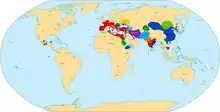1
The year 1 AD (I) was a common year starting on Saturday[1] in the Julian calendar. The year started on a Monday[2] in the Gregorian calendar. It was the first year of the 1st century and 1st millennium.
| Millennium: | |
|---|---|
| Centuries: | – ' – |
| Decades: | – – |
| Years: | – ' – |
| Gregorian calendar | AD 1 I |
| Ab urbe condita | 754 |
| Assyrian calendar | 4751 |
| Balinese saka calendar | N/A |
| Bengali calendar | −592 |
| Berber calendar | 951 |
| Buddhist calendar | 545 |
| Burmese calendar | −637 |
| Byzantine calendar | 5509–5510 |
| Chinese calendar | 庚申年 (Metal Monkey) 2697 or 2637 — to — 辛酉年 (Metal Rooster) 2698 or 2638 |
| Coptic calendar | −283 – −282 |
| Discordian calendar | 1167 |
| Ethiopian calendar | −7 – −6 |
| Hebrew calendar | 3761–3762 |
| Hindu calendars | |
| - Vikram Samvat | 57–58 |
| - Shaka Samvat | N/A |
| - Kali Yuga | 3101–3102 |
| Holocene calendar | 10001 |
| Iranian calendar | 621 BP – 620 BP |
| Islamic calendar | 640 BH – 639 BH |
| Javanese calendar | N/A |
| Julian calendar | AD 1 I |
| Korean calendar | 2334 |
| Minguo calendar | 1911 before ROC 民前1911年 |
| Nanakshahi calendar | −1467 |
| Seleucid era | 312/313 AG |
| Thai solar calendar | 543–544 |
| Tibetan calendar | 阳金猴年 (male Iron-Monkey) 127 or −254 or −1026 — to — 阴金鸡年 (female Iron-Rooster) 128 or −253 or −1025 |
It is one of only seven years to use just one Roman numeral. The seven are 1 AD (I), 5 AD (V), 10 AD (X), 50 AD (L), 100 AD (C), 500 AD (D), and 1000 AD (M).
At the time, it was known as the Year of the Consulship of Caesar and Paullus. The denomination 1 for this year has been used since the early medieval period, when the Anno Domini calendar era became the main method in Europe for naming years. The year before this is 1 BC in the widely used Julian calendar.
Events
Asia
- Start of the Yuanshi era of the Chinese Han Dynasty.
- Confucius is given his first royal title (posthumous name) of Lord Baochengxun Ni.
- Buddhism is introduced into China.
- Emperor Ping of Han China's reign begins.
Africa
- Axum (Ethiopia) is founded (approximate date).
Americas
- Moxos ceases to be a significant religious area in South America (approximate date).
Arts and sciences
Religion
- Birth of Jesus as given by Dionysius Exiguus in his anno Domini era according to at least one scholar.[4][5] However, most scholars think Dionysius placed the birth of Jesus in the previous year, 1 BC.[4][5]
Births
- Lucius Annaeus Gallio, Roman proconsul (d. 65)
- Quinctilius Varus, son of Publius Quinctilius Varus and Claudia Pulchra (d. 27)
- Pallas, Greek Freedman and political advisor (d. 65)
Deaths
- Arshak II of Iberia, king of Iberia of the Nimrodid Dynasty
- Herod the Great 14 Jan 1AD, king of Judea of the Herod Dynasty
References
Wikimedia Commons has media related to 1 (year).
- "CalendarHome.com - 1". calendarhome.com. 2011. Retrieved August 3, 2011.
- "year 1 - Wolfram|Alpha". wolframalpha.com. 2011. Retrieved August 4, 2011.
- The silkroad foundation's silk road chronology Archived 2008-10-14 at the Wayback Machine
- Georges Declercq, Anno Domini: The origins of the Christian Era (Turnhout, Belgium: Brepols, 2000), pp.143–147.
- G. Declercq, "Dionysius Exiguus and the introduction of the Christian Era", Sacris Erudiri 41 (2002) 165–246, pp.242–246. Annotated version of a portion of Anno Domini.
This article is issued from Wikipedia. The text is licensed under Creative Commons - Attribution - Sharealike. Additional terms may apply for the media files.
_Tib%C3%A8re_-_Mus%C3%A9e_Saint-Raymond_Ra_342_b.jpg.webp)
